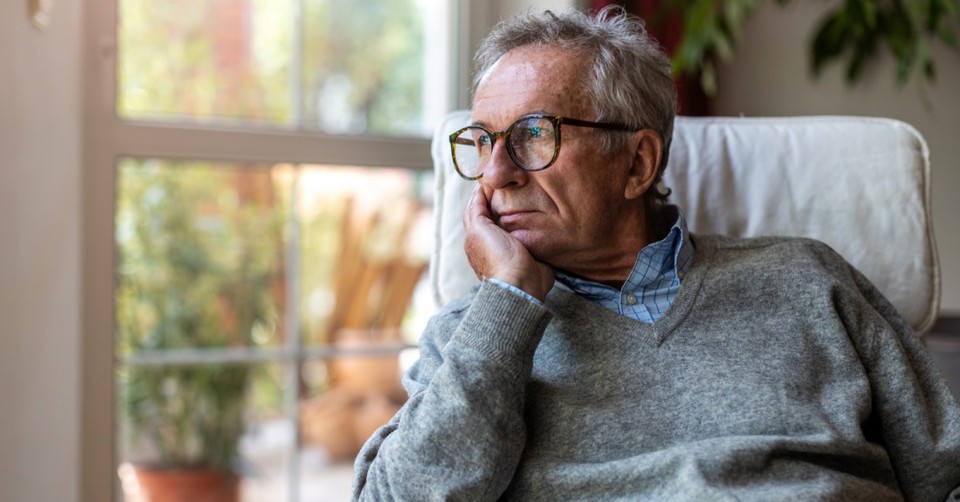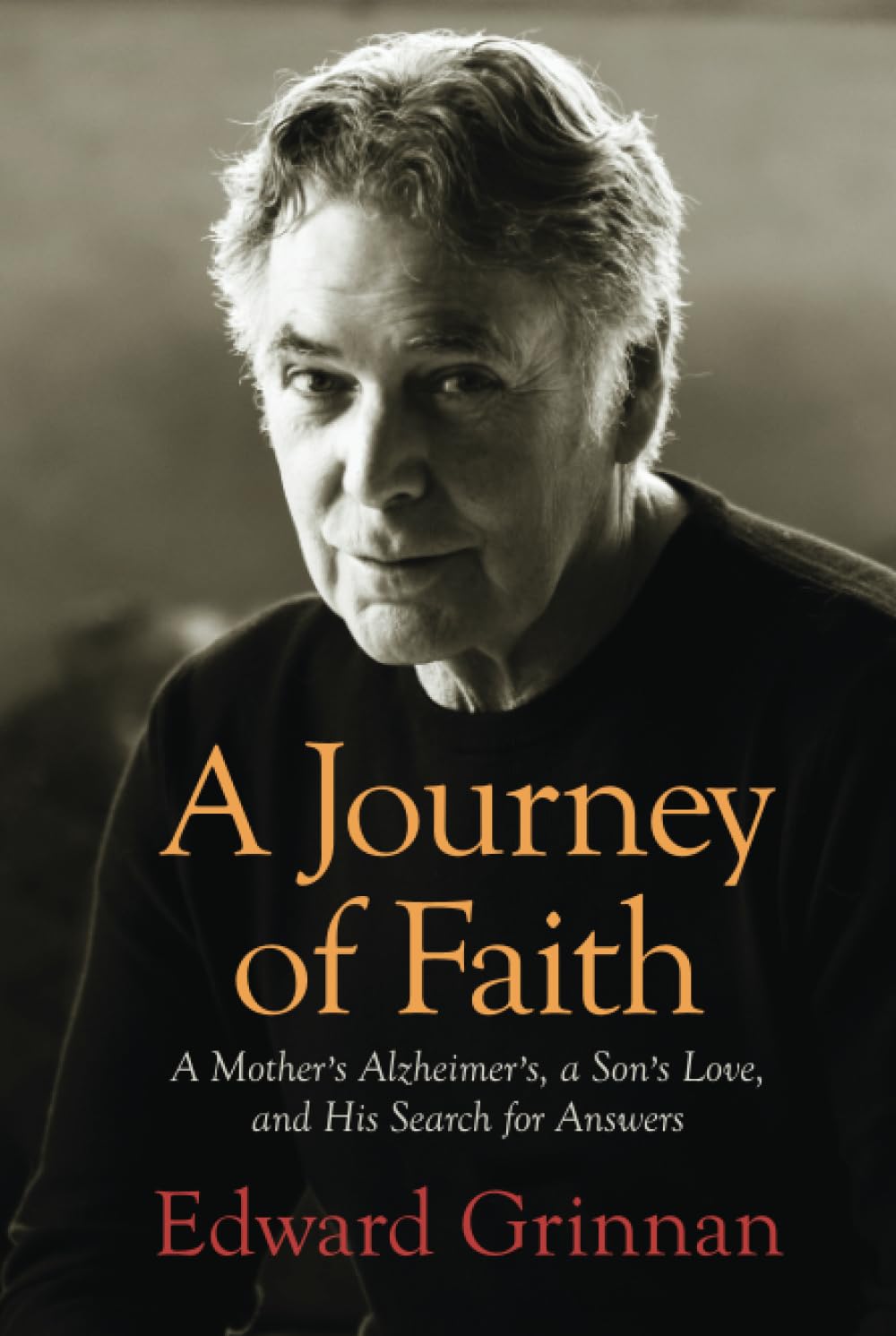How to Be There for Loved Ones with Alzheimer's

My mother was a woman of deep faith. It guided her like a spiritual beacon through life. One of the first clues we had of her incipient dementia, which would eventually be diagnosed as Alzheimer's, was her struggles with her volunteer duties at church. One duty was counting the collection basket after weekday Mass, filling out a deposit slip, and taking it to the bank. She did that for years. Then, one day, her pastor called us—my brother, sister, and me—to say he would have to reluctantly relieve her of that duty. "She's having trouble with the arithmetic," he said.
Mom was always good at math. She used to correct my homework all the time. Maybe she just needed new reading glasses, or her handwriting, terrible to begin with, was getting worse. No, her pastor said, sometimes she forgot to make the deposit altogether. It was a problem.
More than we could have imagined at the time, and now, as I look back, it was the beginning of the serial heartbreak that would last a decade as she declined inexorably and eventually died in memory care; there is currently no cure for Alzheimer's. It begins as a snowball and grows into an avalanche that can engulf a whole family, especially the caregivers. It is a problem that threatens to overwhelm our healthcare system, such as it is. There are currently more than six million people with Alzheimer's, and that number will only increase as the U.S. population ages. By 2050, the cost of the disease to our economy is estimated to be nearly $1 trillion annually, according to the Alzheimer's Association. One in three seniors will succumb to the disease.
So now that I've frightened you, I have some good news, or at least some lessons my family learned in caring for my mother, that I would like to share. Alzheimer's can't be stopped, but the situation can be managed for you and your loved one with practical measures and, most importantly, leaning hard on your faith.
1. Deny Denial
Our first impulse was to write off Mom's slips of memory to the vagaries of an aging brain. No, it couldn't be happening to Mom. I forgot things all the time. I spent half my life looking for stuff I couldn't remember what I did with. It was just part of getting old. But we should have known better. Her father had dementia, and both her sisters died in memory care. One of her brothers was in the early stages when he succumbed to a stroke. Her other two brothers died before they were old enough to show symptoms. Except for a relatively rare type of early onset Alzheimer's, the role that genetics play is still not fully understood, but there is an unmistakable tendency in my family.
For many of us, denial is a kind of default mindset when faced with a difficult reality. I mean, who doesn't set sail on that river in Egypt until the courage to face a problem is found? It's both a defense mechanism and a bargaining position. But there's no bargaining with Alzheimer's.
Even when Mom lost her driver's license and nearly burned her house down, we tried to find reasons to keep her out of full-time residential care. We knew how stubborn, independent, and proud she was, and we couldn't bring ourselves to make that heartbreaking decision. Finally, we had no choice. It is disconcerting to find that you are now in charge of your parent. Yet denial can stand in the way of providing crucial caregiving. Sometimes, the hardest choice is the most loving.
2. Focus on the Practical
Alzheimer's is a disease of the brain that gradually derails cognitive function. We think of it as an affliction that steals our memories, but eventually, it robs us of the very ability to think.
Anyone who has dealt with Alzheimer's has dealt with chaos. Nothing will drive you to your knees faster than trying to love and care for someone whose whole world is disintegrating. There is little you can do to stop it, which is why you must focus on the practical things you can do for your loved one's sake and your own.
I was abundantly blessed by the fact that my brother, Joe, and his wife, Toni, were lawyers, and my sister, Mary Lou, was a social worker. I'm the youngest and lived a two-hour plane ride from home. Joe and Toni were able to take control of and untangle my mother's financial situation. Mary Lou helped find a good, faith-based memory care facility and navigated the byzantine government health care requirements. Me? I mostly prayed, visited as often as possible, and tried not to feel guilty.
We put as much of my mother's life in order as we could, even if the disease itself was beyond our control. We honored her by tying up the loose ends and unfinished business on Alzheimer's occasions because she would have wanted as much. We informed friends and relatives, encouraged them to visit, and ensured she remained on the prayer list at church. We stayed in touch with her doctors and caregivers. We made sure she wasn't forgotten.
3. Be Present in the Moment
Early on, I was eager to correct and redirect my mother. If she said she'd had a pleasant conversation with someone who was long gone, I thought it was helpful to explain the impossibility of it. In reality, all I was doing was adding to her confusion and anxiety. Instead, I learned to meet her in that moment. You talked to Uncle Johnny? How's he doing? What about Aunt Anne? Tell them I said hi. In short, go with it. Whenever possible, validate the reality she is living in, as confusing as it might be.
In truth, those early attempts to redirect Mom were mostly just me believing I could fight the disease, that I could outthink it. But logic and rationality were not my allies. It was only when I recognized my own powerlessness that I truly found acceptance of my mother's condition. That acceptance drew me closer to her. Being present in the moment and listening with your heart is the greatest act of caregiving.
4. Stay Sturdy in Your Faith
I knew my mother was dying when she lost the capacity for speech altogether. She sometimes smiled, though I suspected it was more reflexive than responsive. Yet there was one amazing, miraculous thing. When I prayed with her, her lips would move with mine. Her lips would move when they brought her to say the rosary with the other residents. When she heard a hymn, her lips would move.
I am convinced that my mother never lost touch with the Lord, that the hard core of her faith did not yield to the disease even as everything else that made her who she was disappeared. She was a child of God who could not be wrested from Him.
My own faith was not always so strong. My prayers fought against fear and doubt, and my trust in God sometimes faltered. I wondered if I had been a good and faithful son, worthy of my mother's and God's love. I wondered how a woman of faith could be visited by such misery. Yet it was not for me to know, and only by faith could I understand that.
On my last visit with my mother, I told her how much I loved her, had always loved her, and that even during those times when I drifted from God and church and all the things she so deeply believed in, I knew she still prayed for me and loved me. Maybe it was selfish to unburden myself to a woman who could no longer find words. But as I leaned close, she whispered one: "Love."
It was the last word she ever spoke.
Alzheimer's may take away everything that we are, but I believe it cannot destroy faith and love, which are facets of the soul and exist beyond its reach.
Lately, I've noticed a few misfires in my own memory. Just the vagaries of an aging brain? Is it normal to forget to put the carafe under the coffee maker (my mother did that, too)? To return a jar of curry powder to the dishwasher instead of the spice cabinet? Did I remember to give my dog her daily thyroid pill? I've started to write reminders to myself, which I've never had to do before.
If these things are indications of early dementia, do I want to know? Wanting to know is what makes us human—wanting to know ourselves, wanting to know love, wanting to know the future, wanting to know and worship God. The only thing I am allowed to know with certainty about the future is that God will be present there, as he is present now and has always been present in my past.
Not everyone wants to know how they are going to die. Given my family history of Alzheimer's, I do because knowing is better than not knowing, at least when it comes to dementia. I can plan for long-term care and put my finances in order. I started seeing a neurologist and have undergone neuropsychological testing and brain imaging. It is known that early indications of Alzheimer's can be detected years before a clinical diagnosis is made.
I've been diagnosed with mild cognitive impairment—a somewhat maddeningly vague diagnosis that can mean nothing more than a benign decline of functioning not necessarily unexpected in a 69-year-old-man—and cerebral small vessel disease, meaning I may have experienced minor strokes at some point that could explain my memory lapses. Again, not necessarily an unusual finding in a man my age, and I'm told the brain can work around that damage. Still, my neurologist's clinical notes state that "a diagnosis of Alzheimer's cannot be excluded at this time."
There is no cure once the disease begins, but there is much I can do to forfend its onset—diet, exercise, proper sleep. And faith. Faith, as I saw in my mother, is indestructible. It is my greatest protection, the immutable presence of a loving God. The prayer that has seen me through many spiritual trials in life is called the Serenity Prayer. "Lord, grant me the serenity to accept the things I cannot change, the courage to change the things I can, and the wisdom to know the difference." Nothing could make the future clearer.
Photo credit: ©Getty Images/PIKSEL

Originally published February 16, 2024.




